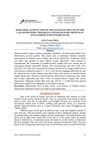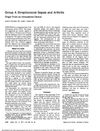 1 citations,
January 2021 in “Journal of the Dermatology Nurses’ Association”
1 citations,
January 2021 in “Journal of the Dermatology Nurses’ Association” The convention discussed various skin conditions and treatments, and highlighted the importance of vaccinations for patients on immune-altering medications.
 January 2025 in “Burns & Trauma”
January 2025 in “Burns & Trauma” Skin organoids help improve wound healing and tissue repair.
[object Object]  November 2024 in “BMC Surgery”
November 2024 in “BMC Surgery” Follicular unit extraction is an effective and minimally invasive treatment for male hair loss.
 September 2024 in “Journal of Clinical Medicine”
September 2024 in “Journal of Clinical Medicine” Permanent makeup can cause delayed allergic reactions, but they can be managed with proper treatment.
 November 2023 in “Journal of cosmetic dermatology”
November 2023 in “Journal of cosmetic dermatology” Fat transplants using a patient's own fat can rejuvenate and repair tissues effectively.
 1 citations,
June 2023 in “BMC Pediatrics”
1 citations,
June 2023 in “BMC Pediatrics” Most children recovered from COVID-19 in 4 weeks, but some experienced long-term symptoms, especially older kids.
 4 citations,
April 2021 in “Experimental and Molecular Medicine”
4 citations,
April 2021 in “Experimental and Molecular Medicine” The conclusion is that certain genetic factors and blood types may affect COVID-19 severity, but changes in ACE2 and TMPRSS2 genes are not clearly linked to it.
 1 citations,
September 2016 in “Journal of Obstetrics and Gynaecology Research”
1 citations,
September 2016 in “Journal of Obstetrics and Gynaecology Research” The study found no significant link between Helicobacter pylori infection and polycystic ovary syndrome in young females.
 34 citations,
September 2020 in “BMC Endocrine Disorders”
34 citations,
September 2020 in “BMC Endocrine Disorders” Existing drug dexamethasone may lower death risk in severe COVID-19 cases; more research needed for other drugs.
 August 2017 in “Journal of epidemiological research”
August 2017 in “Journal of epidemiological research” Cancer rates are increasing in developed countries, with estrogen, aging, low vitamin D3, and HPV infection as common causes.
 1 citations,
November 2022 in “Cureus”
1 citations,
November 2022 in “Cureus” Some COVID-19 patients have skin issues, with men, ICU patients, and those on multiple antibiotics at higher death risk; in-person skin checks by dermatologists are more effective.
 2 citations,
November 2021 in “Regenerative Medicine”
2 citations,
November 2021 in “Regenerative Medicine” UK stem-cell clinics often mislead about treatment safety and effectiveness, needing better regulation.
 April 2022 in “Research Square (Research Square)”
April 2022 in “Research Square (Research Square)” Long COVID recovery is hindered by smoking, with hair loss being a difficult symptom to treat.
86 citations,
June 2018 in “Cochrane library” Mycophenolate mofetil may improve lupus nephritis remission more than cyclophosphamide but with uncertain safety.
 October 2022 in “Asian journal of healthy and science”
October 2022 in “Asian journal of healthy and science” Mother-in-law's tongue leaf extract at 20% concentration significantly promotes hair growth in male rabbits.
 353 citations,
February 2022 in “Nature Immunology”
353 citations,
February 2022 in “Nature Immunology” Long-haul COVID can cause lasting symptoms affecting many body systems and may be linked to ongoing inflammation and immune system issues.
156 citations,
August 2014 in “Cochrane library” Budesonide is not effective for maintaining remission in Crohn's disease beyond three months.
[object Object] 23 citations,
January 2019 in “Journal of wildlife diseases” Boreal caribou in northeastern British Columbia have significant health issues, including infections, tick infestations, and mineral deficiencies.
November 2019 in “SLAS technology” New findings suggest certain genes and microRNAs are crucial for wound healing, and innovative technologies like smart bandages and apps show promise in improving treatment.
 November 2014 in “Hair transplant forum international”
November 2014 in “Hair transplant forum international” Hair restoration surgery in patients with prior neurosurgery or radiation treatment can have risks like infection and poor wound healing, so it's important to discuss these with the patient.
 4 citations,
March 2022 in “Journal of Infection”
4 citations,
March 2022 in “Journal of Infection” Anti-androgen therapy might help protect against COVID-19 infection and reduce death risk.
 113 citations,
July 2020 in “Communications biology”
113 citations,
July 2020 in “Communications biology” Men, especially older ones with health issues like prostate cancer, may have worse COVID-19 outcomes and could benefit from therapies targeting male hormones.
 53 citations,
November 1992 in “Mayo Clinic Proceedings”
53 citations,
November 1992 in “Mayo Clinic Proceedings” HIV can cause unusual and severe skin problems that are hard to treat.
 March 2023 in “Медицинский совет”
March 2023 in “Медицинский совет” COVID-19 may cause different types of hair loss, and the virus's effects on hair could help understand its impact on other body parts.
 21 citations,
January 2021 in “Therapeutic Advances in Endocrinology and Metabolism”
21 citations,
January 2021 in “Therapeutic Advances in Endocrinology and Metabolism” Testosterone may have a dual role in COVID-19, potentially worsening outcomes in men, and testosterone therapy could help some patients, but more research is needed.
 51 citations,
November 2020 in “Journal of the European Academy of Dermatology and Venereology”
51 citations,
November 2020 in “Journal of the European Academy of Dermatology and Venereology” COVID-19 infection may cause significant hair loss, but full hair recovery is likely without special treatment.
 7 citations,
November 1977 in “JAMA”
7 citations,
November 1977 in “JAMA” A woman got a serious strep infection from an IUD, likely passed from her husband's infected throat during sexual activity.
 89 citations,
May 1999 in “Pediatric Dermatology”
89 citations,
May 1999 in “Pediatric Dermatology” New antifungal treatments for a children's scalp infection are effective and safe, but it's not decided if they will become the preferred option over the old treatment.
 1 citations,
November 2023 in “Journal of neurology”
1 citations,
November 2023 in “Journal of neurology” A patient with a nerve disorder died from infection complications after developing insulin resistance from a treatment.
 68 citations,
May 2021 in “Endocrine”
68 citations,
May 2021 in “Endocrine” People with diabetes or obesity should manage their conditions carefully as they have a higher risk of severe COVID-19.

























